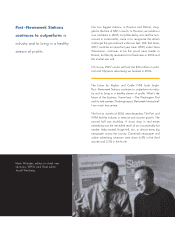Washington Post 2006 Annual Report Download - page 20
Download and view the complete annual report
Please find page 20 of the 2006 Washington Post annual report below. You can navigate through the pages in the report by either clicking on the pages listed below, or by using the keyword search tool below to find specific information within the annual report.eligibility. Kaplan has certified 137 of its U.S. Test Preparation and Admissions Division centers to participate in this
program, and Kaplan's Aspect Education unit has seven locations certified to participate in this program. During 2006
students holding F-1 visas accounted for approximately 4.7% of the enrollment at Kaplan's Test Preparation and
Admissions Division and an insignificant number of students at Kaplan's Higher Education Division.
Title IV Federal Student Financial Aid Programs
Funds provided under the student financial aid programs that have been created under Title IV of the Higher Education Act of 1965,
as amended, historically have been responsible for a majority of the net revenues of the schools in Kaplan's Higher Education Division,
accounting, for example, for approximately $580 million of the revenues of such schools for the Company's 2006 fiscal year. The
significant role of Title IV funding in the operations of these schools is expected to continue.
Title IV programs encompass various forms of student loans with the funds being provided either by the federal government
itself or by private financial institutions with a federal guaranty protecting the institutions against the risk of default. In some
cases the federal government pays part of the interest expense. Other Title IV programs offer non-repayable grants.
Subsidized loans and grants are only available to students who can demonstrate financial need. During 2006
approximately 74% of the Title IV funds received by the schools in Kaplan's Higher Education Division came from student
loans and approximately 26% of such funds came from grants.
To maintain Title IV eligibility a school must comply with extensive statutory and regulatory requirements relating to its
financial aid management, educational programs, financial strength, recruiting practices and various other matters. Among
other things, the school must be licensed or otherwise authorized to offer its educational programs by the appropriate
governmental body in the state or states in which it is located, be accredited by an accrediting agency recognized by the
U.S. Department of Education (the ""Department of Education'') and enter into a program participation agreement with the
Department of Education.
A school may lose its eligibility to participate in Title IV programs if student defaults on the repayment of Title IV loans
exceed specified default rates (referred to as ""cohort default rates''). A school whose cohort default rate exceeds 40%
for any single year may have its eligibility to participate in Title IV programs limited, suspended or terminated at the
discretion of the Department of Education. A school whose cohort default rate equals or exceeds 25% for three
consecutive years will automatically lose its Title IV eligibility for at least two years unless the school can demonstrate
exceptional circumstances justifying its continued eligibility. Pursuant to another program requirement, any for-profit post-
secondary institution (a category that includes all of the schools in Kaplan's Higher Education Division) will lose its Title IV
eligibility for at least one year if more than 90% of that institution's receipts for any fiscal year are derived from Title IV
programs.
Until July 1, 2006, the Title IV program regulations also provided that not more than 50% of an eligible institution's courses
could be provided online and that, in some cases, not more than 50% of an eligible institution's students could be enrolled
in online courses. Those regulations also imposed certain other requirements intended to insure that individual programs
(including online programs) eligible for Title IV funding include minimum amounts of instructional activity. However, Kaplan
University was a participant in the Distance Education Demonstration Program of the Department of Education and as a
result was exempt from the foregoing requirements through June 30, 2006. Legislation enacted in February 2006
repealed the 50% rules described above effective July 1, 2006, for institutions like Kaplan University whose online
programs are approved by an accrediting agency recognized by the Department of Education for that purpose.
As a general matter, schools participating in Title IV programs are not financially responsible for the failure of their students
to repay Title IV loans. However the Department of Education may fine a school for a failure to comply with Title IV
requirements and may require a school to repay Title IV program funds if it finds that such funds have been improperly
disbursed. In addition, there may be other legal theories under which a school could be subject to suit as a result of alleged
irregularities in the administration of student financial aid.
Pursuant to Title IV program regulations, a school that undergoes a change in control must be reviewed and recertified by
the Department of Education. Certifications obtained following a change in control are granted on a provisional basis that
permits the school to continue participating in Title IV programs but provides fewer procedural protections if the Department
of Education asserts a material violation of Title IV requirements. In accordance with Department of Education regulations, a
number of the schools in Kaplan's Higher Education Division are combined into groups of two or more schools for the
purpose of determining compliance with Title IV requirements. Including schools that are not combined with other schools
for that purpose, the Higher Education Division has 39 Title IV reporting units; of these, 11 reporting units have been
provisionally certified, while the remaining 28 are fully certified.
4THE WASHINGTON POST COMPANY
























